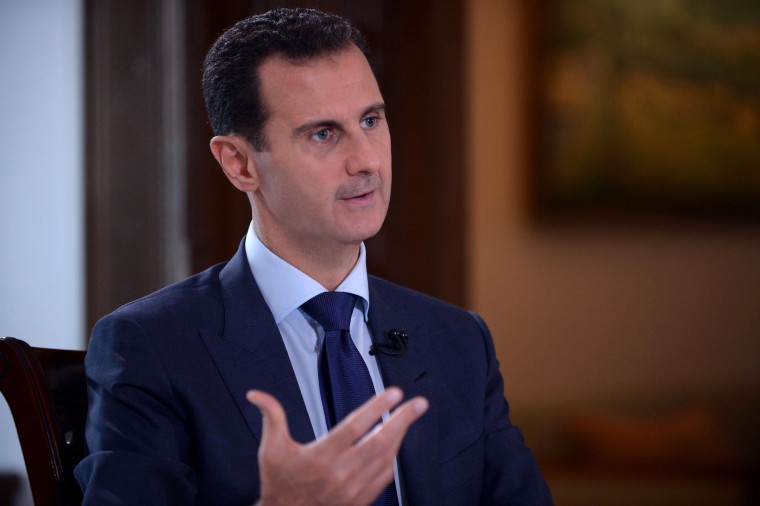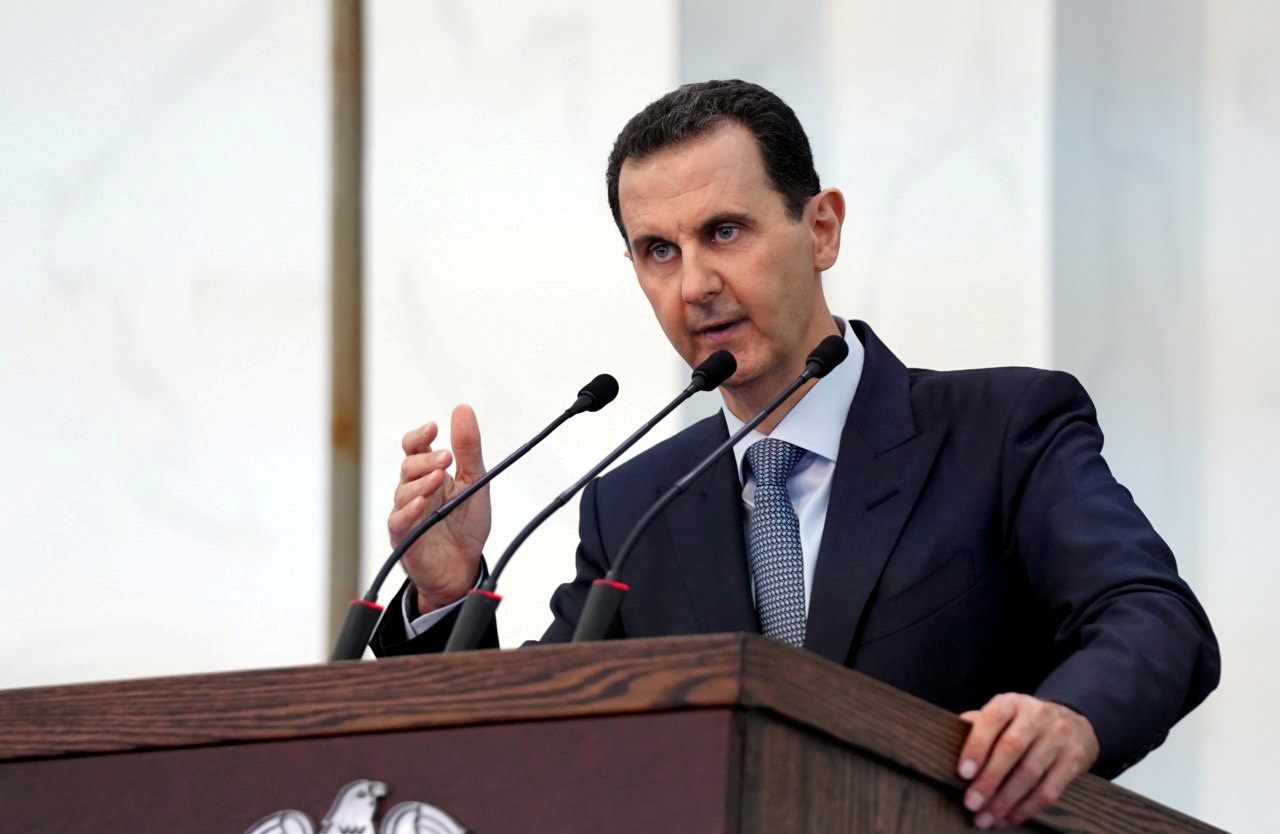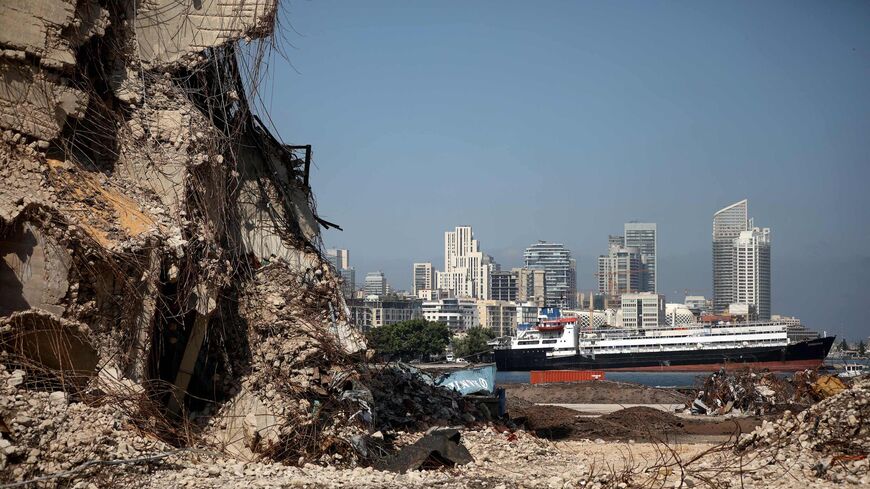The truth about the Syrian funds in Lebanon does not total more than 6 Billion Dollars
And this money was placed in Lebanese banks because they did not have other option
There were many sanctions from the international community not to move out the money from Syria

.. ومصادر مصرفية لبنانية تردّ عليه by annahar.com --
ليست المرة الأولى التي يتحدث فيها الرئيس السوري بشار الأسد عن أن في المصارف اللبنانية ما يراوح بين 40 إلى 60 مليار دولار ودائع للسوريين محتجزة في هذه المصارف ولذلك لا يتمكن الاقتصاد السوري من النهوض. ولا يتحدث الرئيس السوري عن ان تلك الاموال هرّبها اصحابها من المصارف السورية وليسوا في صدد اعادتها ولو تم تحريرها حاليا من لبنان، بل سيجهدون لتحويلها الى دولة ثالثة.
مصادر مصرفية لبنانية استغربت عبر وكالة "أخبار اليوم" هذا الكلام وقالت إن سبب عدم نهوض الاقتصاد السوري هو الحرب التي شهدتها البلاد منذ العام 2011، والعقوبات المفروضة على سوريا ونظامها ومؤسساته، إضافة إلى أن عملية إعادة الإعمار لم تبدأ بعد وليس من دولة واحدة حليفة للنظام السوري بدأت عملها في هذا الإطار، وشددت هذه المصادر على أن كلام الأسد يأتي في إطار الذرائع التي يريد من خلالها تبرير ركود الاقتصاد السوري وتراجعه، متجاهلا المشاكل الداخلية التي يعانيها النظام هناك.

by ncregister.com -- WASHINGTON — Bishop Gregory John Mansour of the Eparchy of St. Maron in Brooklyn, New York, and Bishop Abdallah Elias Zaidan of the Eparchy of Our Lady of Lebanon of Los Angeles spoke with the Register at the 2021 International Religious Freedom Summit in Washington, D.C., on Wednesday. They shared how the beleaguered nation of Lebanon is a “religious haven” for so many faiths, including Christians, and detailed some of the threats and challenges to that coexistence. Bishop Mansour went to Lebanon earlier this month for the synod of bishops’ meeting with the head of the Maronite Church, Patriarch Cardinal Béchara Boutrous Rai.
Bishop Mansour called Lebanon “unique” because “it was formed, on purpose, to be a religious haven for Christians and Muslims.” He summarized the history of its formation, which was “at the initiative of the Maronite patriarch, Patriarch Elias Hoayek,” who in 1919 “went on a boat from Lebanon to Versailles, France, to meet with the Allied forces after they had defeated the Ottoman Empire so that a Lebanon carved out of the Middle East could include Christians and Muslims alike and the boundaries even were purposefully designed so that Sunni, Shiite and Christians could live in conviviality.” “By God’s grace, he got his way, and Lebanon was formed in a national pact between the religious communities, which is at the very heart of it. It was a pact between the religious communities, 18 different communities in Lebanon,” he said. Drawing on the history of its formation, Bishop Mansour said that he and Bishop Zaidan were at the religious-freedom summit in order to “promote and to advocate for a Lebanon that continues to be, as Pope John Paul II said, ‘more than a country, a message.’”
Current Challenges
Bishop Zaidan told the Register that, today, Lebanese Christians are facing challenges to that message, including “fear of that abuse of power outside the government from militia, specifically Hezbollah, that could undermine the existence of the country as an independent country, which means this would undermine democracy.” “That’s why the Church always stands for the government to be a strong, unified government for everybody,” he said. “Lebanon is a country for all, not just the Christians, not just one Muslim [group]; it’s for everybody to have and enjoy religious freedom — freedom at all sides, not freedom from religion, freedom of religion. And we want peace.” He continued, “That’s why our Patriarch Cardinal Rai has been a great advocate for neutrality of Lebanon, so that Lebanon can continue its mission; and we ask all the countries of the world to support that effort and to come together and support Lebanon.”

BEIRUT (Reuters) - Syrian President Bashar al-Assad said on Saturday the main impediment to investment in the country was money stuck in ailing Lebanese banks. In a speech after being sworn in as president for a fourth term, Assad said estimates suggested the frozen funds were worth between $40 billion and $60 billion. "Both figures are enough to depress an economy like ours," he said. Lebanon is in the throes of a deep economic meltdown that is threatening its stability. Lebanese banks have locked depositors out of their accounts and blocked transfers abroad since the start of the country's crisis in late 2019. Many Syrian front companies had long circumvented Western sanctions by using Lebanon's banking system to pay for goods which were then imported into Syria by land.
Assad also said Syria would continue working to overcome difficulties caused by the Western sanctions imposed over its decade-long war. "Sanctions haven't prevented us from securing our basic needs but they have created some choke points," he said. "We will continue to work to overcome them without announcing what methods we used before to do that or what we will use in the future." Syrian authorities blame Western sanctions for widespread hardship, including soaring prices and people struggling to afford food and basic supplies. Assad secured a fourth term in office in a May election, winning more than 95% of the votes.

by al-monitor.com -- France will organize an international fundraiser for Lebanon next month, timed to coincide with the first anniversary of the deadly explosion that tore through Beirut. The UN-supported conference on Aug. 4 will be hosted by French President Emmanuel Macron and will aim to "respond to the needs of the Lebanese whose situation is deteriorating every day," France's Foreign Ministry said in a statement. The French announcement comes a day after Lebanese Prime Minister-designate Saad Hariri resigned after failing to form a government amid the partisan gridlock. Hariri said he withdrew his nomination after he and President Michel Aoun were unable to agree on a proposed cabinet lineup. Hariri's predecessor, current caretaker Prime Minister Hassan Diab, quit amid ongoing protests demanding accountability for the Aug. 4 explosion in Beirut, which officials blame on a stockpile of highly explosive ammonium nitrate stored improperly at Lebanon’s most vital port. The blast, which killed more than 200 people, injured thousands more and gutted much of the capital, added to the country’s economic woes.
Khazen History


Historical Feature:
Churches and Monasteries of the Khazen family

St. Anthony of Padua Church in Ballouneh
Mar Abda Church in Bakaatit Kanaan
Saint Michael Church in Bkaatouta
Saint Therese Church in Qolayaat
Saint Simeon Stylites (مار سمعان العامودي) Church In Ajaltoun
Virgin Mary Church (سيدة المعونات) in Sheilé
Assumption of Mary Church in Ballouneh
1 - The sword of the Maronite Prince
2 - LES KHAZEN CONSULS DE FRANCE
3 - LES MARONITES & LES KHAZEN
4 - LES MAAN & LES KHAZEN
5 - ORIGINE DE LA FAMILLE
Population Movements to Keserwan - The Khazens and The Maans
ما جاء عن الثورة في المقاطعة الكسروانية
ثورة أهالي كسروان على المشايخ الخوازنة وأسبابها
Origins of the "Prince of Maronite" Title
Growing diversity: the Khazin sheiks and the clergy in the first decades of the 18th century
Historical Members:
Barbar Beik El Khazen [English]
Patriach Toubia Kaiss El Khazen(Biography & Life Part1 Part2) (Arabic)
Patriach Youssef Dargham El Khazen (Cont'd)
Cheikh Bishara Jafal El Khazen
Patriarch Youssef Raji El Khazen
The Martyrs Cheikh Philippe & Cheikh Farid El Khazen
Cheikh Nawfal El Khazen (Consul De France)
Cheikh Hossun El Khazen (Consul De France)
Cheikh Abou-Nawfal El Khazen (Consul De France)
Cheikh Francis Abee Nader & his son Yousef
Cheikh Abou-Kanso El Khazen (Consul De France)
Cheikh Abou Nader El Khazen
Cheikh Chafic El Khazen
Cheikh Keserwan El Khazen
Cheikh Serhal El Khazen [English]
Cheikh Rafiq El Khazen [English]
Cheikh Hanna El Khazen
Cheikha Arzi El Khazen
Marie El Khazen